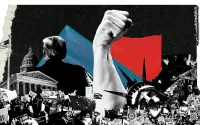29 July 2004Kevin Watkins
There is a Swahili proverb that says, "When elephants fight, the grass gets crushed. When elephants make love, the grass gets crushed." Watching Europe and America trample like rogue elephants over the interests of developing countries at the crucial World Trade Organization talks now under way in Geneva confirms the proverb's enduring wisdom.Negotiators have just a few days to conclude an agreement for reviving a new global trade pact meant to usher developing nations more fully into the world's trading networks. Success in these talks, known as the Doha round, would be an ambitious move toward making globalization a more powerful force for poverty reduction. Failure will sound the death knell for this round. More important, a breakdown would inflict irreparable damage on the WTO and the rules-based multilateral trading system it represents, with attendant consequences for trade tensions.There was hope that the European Union and the United States would provide political leadership in Geneva. Instead, they appear bent on wrecking the Doha round. There is now a real danger that trans-Atlantic rivalries will pre-empt an agreement, although the more likely outcome is a watered-down WTO deal designed to accommodate EU-U.S. interests. With or without a pact, developing countries stand to lose.As ever, agriculture is at the heart of the problem. President Jacques Chirac of France is working overtime to persuade EU countries to reject a WTO draft agreement that would phase out export subsidies.These subsidies drive down world prices and push farmers in Africa and elsewhere out of markets and into poverty. Developing countries regard their elimination as non-negotiable, as does the United States.To be fair, the WTO draft agreement under consideration in Geneva is hopelessly unbalanced. While prohibiting EU export subsidies, it would only partially restrict U.S. recourse to subsidize export credit programs. These now run at over $7 billion a year. There is no justification for allowing American negotiators to slip through an export subsidy prohibition net.Viewed from Africa, the WTO draft contains even more fatal flaws. Governments in the region have insisted from the outset on an early harvest of cuts on U.S. cotton subsidies - and for good reason. In West Africa alone they cost near $200 million a year in lost earnings. Yet the proposed framework offers little more than weasel words affirming the importance of the issue.For his part, the U.S. trade representative, Robert Zoellick, has made it clear that there will be no new commitments on cotton. Like Chirac, it seems that Washington regards placating rich farmers as a higher priority than advancing multilateralism. Good news down on the cotton belt - bad news for the rest of the world.Whatever their differences over agricultural export subsidies, in some areas the EU and the United States are forging a trans-Atlantic consensus. Unfortunately, the consensus in question is deeply hostile to the goal adopted when the Doha round was launched: The development of a system of rules designed to increase the benefits of trade for developing countries.While the EU and the United States may preach free-market principles to the developing world, when it comes to agriculture they want WTO rules that allow them to protect and subsidize at home. Both sides insist on the right to exempt from liberalization a wide range of "sensitive products" - a euphemism for products in which developing countries have a competitive advantage. They are also working hand-in-hand to expand loopholes for agricultural subsidies. Shorn of technicalities, these would have the effect of exempting billions of dollars in farm payments from WTO cuts.In stark contrast to their reluctance to liberalize at home, Europe and America are enthusiastic advocates for liberalization in developing countries. Notwithstanding the scale of its own farm subsidies, the United States insists that developing countries must rapidly open their agricultural markets. And along with the EU, it wants a dilution of WTO rules that allow developing countries to liberalize markets for manufactured goods at a slower pace.These demands are at the heart of the deadlock with developing countries, many of which fear that rapid market opening - especially in agriculture - will undermine prospects for growth, generate unemployment, and cause social dislocation. They are right. Witness the disappointing results of Latin America's embrace of rapid liberalization. The last thing the world needs now is WTO rules that restrict the policy space needed to make trade work for the poor.In an eerie rerun of the breakdown on negotiations in Cancún last year, the European Union and the United States have already started blaming developing countries for failure. African governments have been roundly condemned for making "unrealistic" demands on cotton (and how naughty it is of them to call on the U.S. to apply free market trade principles). Latin America and India have been castigated for demanding better access to industrial country markets. And the entire developing world has been denounced for failing to fall into line with demands for rapid liberalization.All of this is a transparently absurd exercise in blaming the victim. What we are witnessing in Geneva is a failure of European and American political leadership of epic proportions. Private vested interests in agriculture are being allowed to override the wider public interest in strengthening multilateralism and reducing poverty.Even at this eleventh hour, there is time to avert the failure now looming. And no political leader should be willing to accept the costs that failure will imply.Kevin Watkins is head of research at Oxfam.






